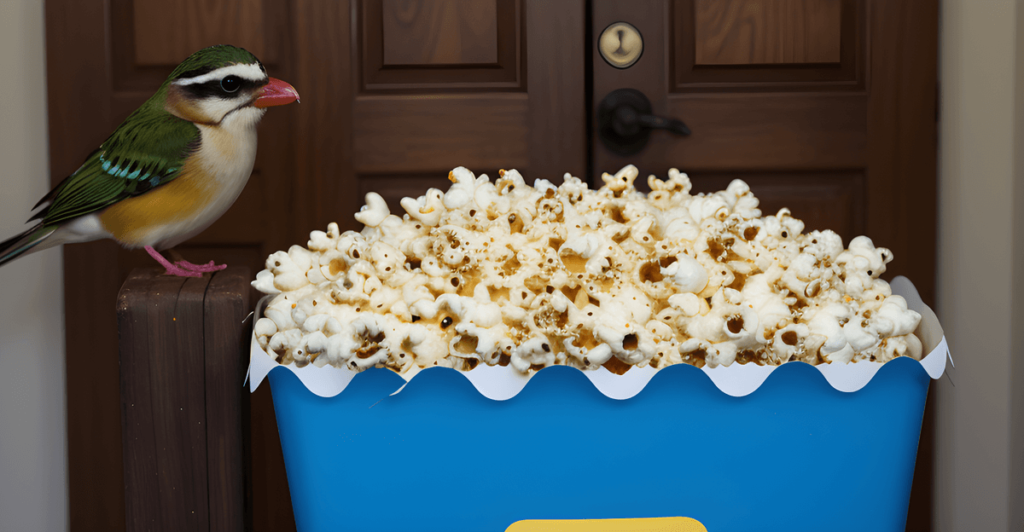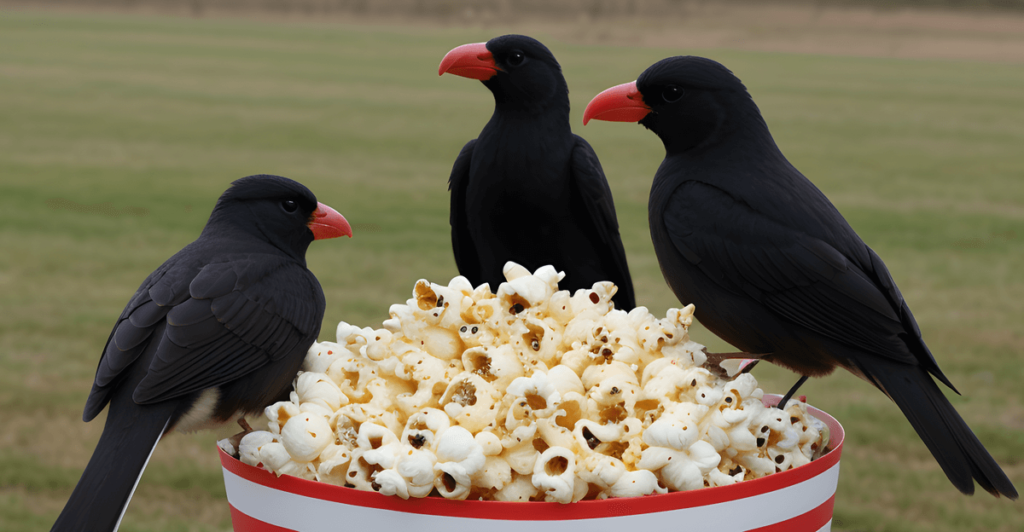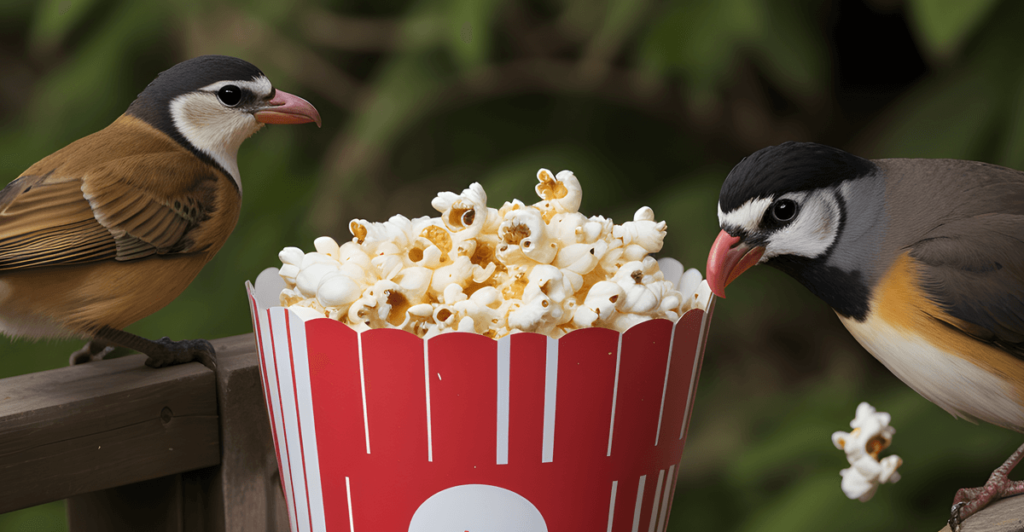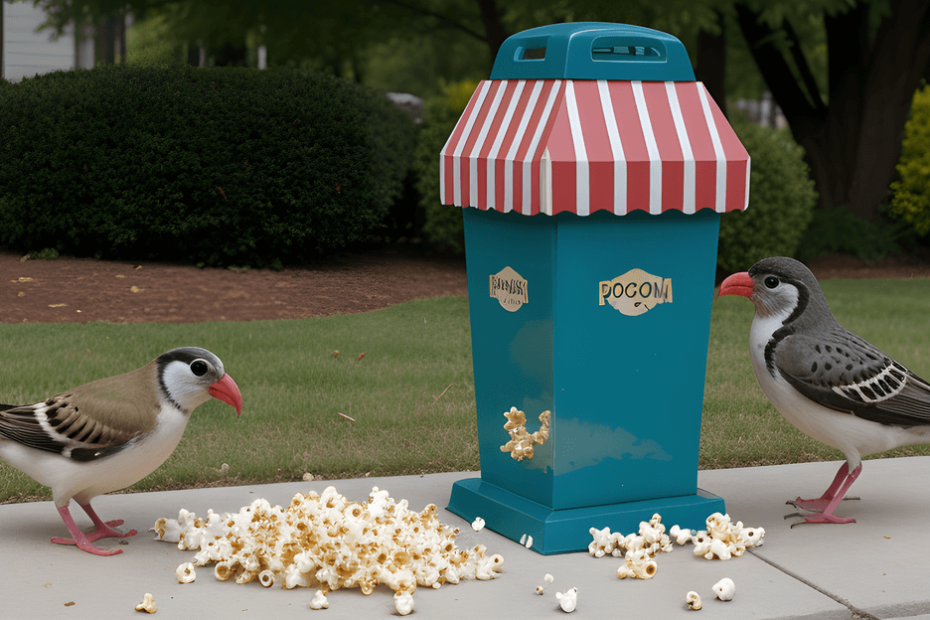Key Takeaways
- Choose the Right Birds: Only certain birds, like chickens, ducks, and geese, can safely eat popcorn.
- Offer plain, unsalted, and air-popped popcorn and natural foods to birds to avoid potential health hazards.
- Avoid Additives: Ensure that the popcorn is free from butter or seasoning, as these can be harmful to birds.
- Moderation is Key: Feed popcorn to birds in moderation as it should not replace their primary diet of seeds, fruits, and insects.
- Consider Alternatives: While popcorn can be an occasional treat, consider offering healthier alternatives like birdseed, fresh fruits, and vegetables.
- Check for Freshness: Always check the expiration date and ensure that the popcorn is fresh before offering it to birds.
Introduction
Curious about whether many birds can indulge in a bit of popcorn? Well, you’re in for an avian treat. Let’s uncover the truth behind this crunchy conundrum and explore the dietary habits of birds, including cracked corn and feed. From wild birds like sparrows to parrots, we’ll delve into the potential impact of popcorn feed on their health and behavior. So, before you toss that cracked corn out for your wild birds or contemplate sharing your movie night snack with Polly, let’s flap into the facts together.
Now, prepare to spread your wings as we navigate through this surprising topic. It’s time to settle this debate once and for all! Stay tuned as we unravel the mystery surrounding whether birds can safely munch on these fluffy puffs or if it’s best for them to stick to their natural diet. Let’s dive right in!
Understanding the Nutritional Value of Popcorn for Birds
Essential Nutrients in Popcorn
Popcorn is a whole grain that contains fiber and some protein. It also provides essential nutrients like manganese, phosphorus, zinc, and corn. These nutrients are crucial for the overall health and well-being of birds.
Popcorn is not just an enjoyable snack for humans; it can also be a healthy treat for our feathered friends when offered in moderation. The fiber content in popcorn aids in digestion, while the protein supports muscle development and repair in birds.
Birds need various nutrients to maintain their health, including vitamins, minerals, carbohydrates, fats, and proteins. Popcorn offers some of these essential nutrients that contribute to the overall nutritional needs of birds.

Moderation is Key
While popcorn can offer beneficial nutrients to birds, it’s important to remember that moderation is key. Offering too much popcorn or any other treats can lead to imbalances in a bird’s diet.
Just like with any treat or supplement food given to pets or animals, overfeeding on popcorn could potentially cause harm by displacing other vital elements from a bird’s diet. Therefore, it’s crucial to ensure that the majority of a bird’s diet consists of nutritionally balanced foods specifically designed for them.
It’s always best practice to consult with an avian veterinarian or avian nutrition specialist before introducing new foods into your pet bird’s diet. They can provide valuable guidance on incorporating treats such as popcorn into your bird’s feeding routine without compromising its nutritional needs.
Identifying Birds That Can Safely Eat Popcorn
Safe Bird Species
Parrots, doves, and pigeons are among the few bird species that can safely consume popcorn. These birds have strong beaks and digestive systems that allow them to handle this occasional treat. For example, parrots, with their powerful beaks, can easily crack open popcorn kernels.
Popcorn is a suitable snack for backyard birds like doves and pigeons as it provides essential carbohydrates for energy. However, it’s important to note that while some wild birds may eat popcorn if offered, not all of them should consume it regularly due to their different dietary needs.
I’ve found that offering smaller pieces of popcorn or even crushed popcorn can make it easier for smaller bird species to eat. This ensures they don’t struggle with larger pieces and helps prevent any potential choking hazards.
Consultation with Avian Veterinarian
Before offering any exotic bird species such as parakeets or cockatoos popcorn as a treat, consulting with an avian veterinarian is crucial. Exotic birds often have more specific dietary requirements compared to common backyard birds or wildlife.
Consulting a professional will help ensure the safety of the bird’s diet since certain exotic species may have sensitivities or allergies to certain types of food. Veterinarians can provide guidance on portion control and frequency when introducing new treats into a bird’s diet.
When considering giving treats like popcorn to pet birds such as parrots, I always consult my avian veterinarian first. They offer valuable advice tailored specifically to my bird’s health condition and overall nutritional needs.
How to Prepare Popcorn for Avian Consumption
Best Popcorn Choices
When considering whether birds can eat popcorn, it’s important to choose the right type. Opt for air-popped or plain microwave popcorn without salt or butter. These options are the safest and healthiest choices for our feathered friends. Avoid flavored or heavily seasoned popcorn, as these varieties often contain additives that may be harmful to birds.
As a bird enthusiast, I always ensure that the popcorn I offer my avian companions is free from any flavorings, salt, or butter. This way, I can guarantee their safety and well-being while enjoying this occasional treat.
Safe Size for Birds
To make popcorn suitable for birds, it’s essential to break large kernels into smaller pieces before offering them to your avian friends. Doing so helps prevent choking hazards and ensures that the snack is more manageable and safer for consumption by various bird species.
I’ve found that breaking large kernels into smaller pieces not only makes it easier for birds to eat but also reduces the risk of potential choking incidents among my feathery visitors.

Cautionary Considerations
While sharing popcorn with birds can be enjoyable and entertaining, it’s crucial to exercise caution when doing so. While small amounts of plain popcorn are generally safe as an occasional treat in a bird’s diet, moderation is key. Too much starchy food like popcorn could lead to nutritional imbalances in birds’ diets over time.
In addition to providing helpful information about preparing popcorn safely for avian consumption based on scientific facts and personal experiences, it’s important to remind fellow bird enthusiasts about exercising moderation when feeding treats like plain popcorn to our feathered friends.
Can Birds Eat Popcorn? The Best Type of Popcorn for Birds
Unsalted and Unbuttered
The safest option is unsalted and unbuttered. Salt and butter can be harmful to birds’ digestive systems. These additives can lead to dehydration and other health issues in birds.
Organic or non-GMO popcorn is also a better choice as it minimizes potential pesticide exposure for birds. Pesticides on conventional popcorn may pose risks to the health of our feathered friends, so opting for organic or non-GMO varieties helps reduce this concern.
Minimal Hulls
Choosing popcorn with minimal hulls is crucial in reducing the risk of digestive issues in birds. Hulls are hard coverings that surround the kernel, which can be difficult for birds to digest properly. By selecting varieties with fewer hulls, we can help ensure that our avian companions enjoy their snacks without encountering potential digestive problems.
I’ve found that when providing unsalted, unbuttered, organic, or non-GMO popcorn with minimal hulls, I feel confident knowing that I’m offering a safe treat for my bird friends. It’s important to remember that even though they may enjoy snacking on some human foods, not all items are suitable for their consumption.
Potential Hazards of Feeding Popcorn to Birds
Choking Hazard
Feeding birds popcorn, especially unpopped kernels, can pose a choking hazard. Birds may accidentally ingest the hard kernels, leading to potential respiratory blockage or choking. The size and hardness of these unpopped kernels make them particularly risky for birds. If a bird swallows an unpopped kernel, it could get stuck in their throat or cause damage as it travels through their digestive system.
Popcorn is typically made from corn kernels that have been heated until they explode into fluffy pieces. However, some of these kernels don’t pop and remain hard and dense. When birds consume these unexploded bits, they are at risk of experiencing severe health issues.
Sodium and Fat-Related Health Problems
Salted or buttered popcorn can lead to sodium and fat-related health problems in birds. While small amounts might not be immediately harmful, excessive salt intake can lead to dehydration and kidney issues in birds. The high fat content in buttered popcorn can contribute to obesity in birds if consumed regularly.
When considering feeding popcorn to birds as a treat or snack option, it’s crucial to ensure that any seasoning used is minimal or absent altogether. This will help mitigate the risks associated with excess sodium and fat consumption by our feathered friends.
Crop Impaction
Consuming large quantities of popcorn may cause crop impaction in birds – a condition where food becomes lodged within the bird’s crop (a pouch-like organ used for storing food). Since popcorn expands when ingested due to its ability to absorb moisture quickly, there is an increased risk of crop impaction when birds eat significant amounts of this snack.
Crop impaction poses serious health risks for birds, potentially leading to discomfort during digestion processes or even requiring medical intervention if left untreated for extended periods.
To ensure the well-being of our avian companions remains intact while offering treats like popcorn occasionally; we must be mindful about potential hazards associated with such foods.

Avoiding Additives in Popcorn for Bird Safety
Artificial Additives
Artificial additives and preservatives in popcorn can be harmful to birds. These chemical flavorings and colorings should be completely avoided when feeding birds. Flavorings such as artificial butter, cheese, or spices often contain chemicals that are not safe for birds.
It’s important to read the labels on popcorn packages carefully. Look out for any mention of artificial additives, colors, or preservatives. Even if a particular type of popcorn is marketed as “bird-friendly,” it’s crucial to scrutinize the ingredients list.
Preservative-Free Options
Opting for natural and organic popcorn options is the best way to ensure bird safety. Natural popcorn without any added flavors or seasonings is a safer choice when considering feeding it to birds.
When selecting popcorn specifically for bird consumption, look for plain varieties with no seasoning at all. This ensures that there are no hidden chemicals that could potentially harm our feathered friends.
I always make sure I choose air-popped popcorn instead of microwaveable versions because they tend to have fewer additives and preservatives.
Homemade Popcorn
Making your own homemade popcorn using organic kernels can also guarantee its safety for birds. By popping the kernels yourself without adding any artificial flavorings or excessive salt, you have full control over what goes into the snack.
One thing I’ve learned from my experience is that making homemade plain popcorn allows me to enjoy it with peace of mind knowing that it’s safe enough to share with my pet bird.
The Benefits of Feeding Popcorn to Birds
Mental Stimulation
Birds can eat popcorn as a source of mental stimulation during treat time. The process of pecking at the small, light pieces of popcorn can engage their natural foraging instincts, providing them with physical and mental exercise. This activity is particularly beneficial for birds that spend most of their time in cages or enclosed environments.
Popcorn’s unique texture and taste offer variety in the bird’s diet experience. Including different food options like whole grains such as popcorn can prevent dietary monotony and enhance the overall satisfaction derived from mealtime. By adding variety to their diet, birds are less likely to become bored or disinterested in eating.
Bonding Tool
When given in moderation, popcorn can be a bonding tool during training sessions with birds. It provides an opportunity for positive reinforcement when teaching new tricks or behaviors. For example, offering a small piece of popcorn as a reward after successfully completing a training task reinforces the desired behavior and strengthens the bond between the bird and its owner.
During my experience with my pet parakeet, I found that incorporating small amounts of plain, unsalted popcorn into our training sessions helped create an enjoyable learning environment for both me and my bird. It added an element of excitement to our interactions while also serving as a tasty incentive for good behavior.
Alternative Foods to Offer Your Feathered Friends
Fresh Fruits
Fresh fruits like apples, bananas, and berries are excellent options for providing essential vitamins to birds. They offer a natural source of vital nutrients that can contribute to the overall health of your feathered friends. For example, apples provide fiber and vitamin C while bananas are rich in potassium.
Birds enjoy a variety of fruits as part of their diet, especially when they’re ripe and easy to eat. When considering feeding fresh fruits to birds, it’s important to remember that some fruits contain seeds or pits that may be harmful if ingested. Always remove these potential hazards before offering them as treats.
I’ve found that my pet bird particularly enjoys munching on small pieces of apple and berry slices. It’s fascinating how they peck at the fruit with such enthusiasm!
Nutritious Vegetables
In addition to fresh fruits, nutritious vegetables such as carrots, broccoli, and leafy greens can play a significant role in diversifying the dietary intake of birds. These veggies provide essential nutrients like beta-carotene from carrots and vitamin K from leafy greens.
Offering a mix of finely chopped or grated vegetables can make it easier for smaller bird species to consume these nutritious foods. However, avoid using any seasoning or dressing when preparing the vegetables for your avian companions.
From my personal experience with pet birds, I’ve noticed how much they relish nibbling on carrot shreds and small pieces of broccoli florets. It’s heartwarming to see them enjoying their healthy snacks!
Pelleted Bird Food
Pelleted bird food formulated specifically for avian nutrition is an ideal staple diet because it offers balanced levels of essential nutrients required by birds. These specially designed feed options often contain a blend of seeds, grains, minerals, and other necessary components tailored for different types of avian species.
When selecting pelleted bird food for your feathered friends’ daily meals, consider choosing varieties without added sugars or excessive carbohydrates which might not align with their nutritional needs.
I always ensure that my pet bird has access to high-quality pelleted bird food as its primary diet staple since it provides all the necessary nutrients required for optimal health.
Addressing Concerns About Expired Popcorn and Birds
Mold Growth
Stale or expired popcorn should never be offered to birds due to the potential for mold growth. Moldy popcorn can contain mycotoxins, which are harmful to birds’ health. When ingested, these toxins can lead to digestive issues and even neurological problems in avian species. As a responsible pet owner or backyard bird enthusiast, it’s crucial to inspect any food items before offering them to your feathered friends.
It’s important not only for the well-being of our avian companions but also for the preservation of wildlife in general. Imagine if every individual who enjoys feeding birds at the park unknowingly offered stale popcorn; this could have detrimental effects on the local bird population.
Rancid Oils
In addition to mold concerns, rancid oils present in old popcorn can pose a threat to birds’ digestive systems. The fats in unpopped kernels that have gone bad may cause gastrointestinal distress and even lead to long-term health issues for wild and pet birds alike. Therefore, it’s essential to always check the freshness of any snacks you plan on sharing with your avian visitors.
As someone who loves spending time outdoors with my family, I’ve had numerous encounters with people offering various foods like stale bread and old popcorn at parks and other recreational areas where wild birds congregate. It’s crucial that we educate ourselves about suitable treats for our feathered friends so we can ensure their well-being while still enjoying watching them up close.
To sum up, being mindful about what we offer as treats is key.
Closing Thoughts
After delving into the world of birds and popcorn, it’s clear that while some avian species can enjoy this snack, caution is paramount. Understanding the nutritional value of popcorn for birds and identifying the safe types are crucial. Remember, always prioritize their well-being by avoiding harmful additives and potential hazards. Exploring alternative foods can provide a diverse and balanced diet for our feathered friends. Lastly, being mindful of expired popcorn is essential to prevent any health risks.
Now that we’ve covered the dos and don’ts of feeding popcorn to birds, let’s take action to ensure their safety and happiness. Consider implementing these insights when sharing snacks with our feathered companions. Together, we can create a healthier environment for them to thrive in.
Frequently Asked Questions
Can birds safely eat popcorn?
Yes, some birds can safely eat plain, unsalted, and unbuttered popcorn as an occasional treat. However, it’s essential to understand which bird species can consume this snack without any adverse effects.
What are the potential hazards of feeding popcorn to birds?
The primary risks associated with feeding popcorn to birds include choking hazards from unpopped kernels and digestive issues if the popcorn is salted or buttered. It’s crucial to offer only plain, air-popped popcorn in moderation.
How should I prepare popcorn for avian consumption?
To prepare safe popcorn for birds, ensure that it is completely plain and free from additives like salt or butter. Make sure that all kernels are fully popped to minimize the risk of choking for our feathered friends.
What are the benefits of feeding popcorn to birds?
Feeding plain and unsalted popcorn in moderation can provide enrichment for certain bird species by offering a different texture and taste experience. It can be used as a part of a varied diet but should not be a primary food source.
Are there alternative foods I can offer my feathered friends instead of or alongside popcorn?
Absolutely! Birds enjoy various fruits, vegetables, seeds, nuts, and specially formulated commercial bird food mixes. These options provide essential nutrients while catering to different dietary preferences among avian species.
